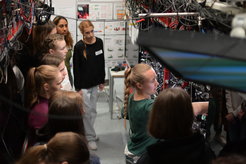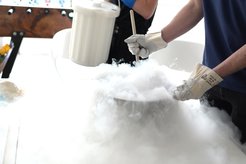Frozen yoghurt, roses and lasers - Girls' Day 2024 at the MPQ
As part of the nationwide Girls' Day initiative, 13 schoolgirls aged 14 to 17 visited the institute to explore the fascinating world of quanta.
Since 2001, girls and young women from all over Germany have the opportunity to explore a wide range of technical and scientific professions on Girls' Day. The MPQ has been taking part in the initiative for many years - with a mix of experiments and exciting insights into the world of quantum optics. Promoting young female scientists is a major concern of the institute, starting with Girls' Day, which aims to get girls of school age interested in physics. A recently produced film tells the story of what it is like to work as a woman in experimental physics or quantum optics.

A packed programme awaited this year's Girls' Day participants. In addition to talks by Dr Silke Stähler-Schöpf, head of the school laboratory, and PhD student Maya Büki, the day's main theme was "try it yourself". In the Photonlab school laboratory, the participants had a go at the various experiments and learnt about physical phenomena in a fun way - in particular, how lasers work, which play an important role in the institute's research.

As every year, the various experiments with nitrogen were a particular highlight. When Silke Stähler-Schöpf mixed liquid nitrogen with yoghurt, berries and sugar to create a delicious frozen yoghurt, the bowl looked like a witch's cauldron. The girls also got to see the student laboratory's nitrogen railway, which demonstrates the principle of superconductivity. The small train is filled with liquid nitrogen, which cools the superconductor in its housing. The result: the small train subsequently floats unhindered over the magnetic track. And in the rose experiment, the participants dipped yellow and pink roses in liquid nitrogen - and smashed the ice flowers afterwards.
The Girls' Day participants also recieved insights into work at MPQ. In the mechanical workshop, they learnt from the head Michi Rogg which materials are processed into customised workpieces and how the ultra-modern CNC machines work. In her presentation, PhD student Maya talked about her research, which focuses on the construction of a quantum network. The students were particularly impressed by a new research collaboration with LMU, in which a single photon is to be sent from Munich city centre to Garching.
In the concluding Kahoot quiz, the participants demonstrated what they had learnt on Girls' Day. When was the MPQ founded again? What does LASER stand for? And what are female physicists actually like? All participants were able to answer the last question correctly - female physicists are versatile, important and certainly not boring!













